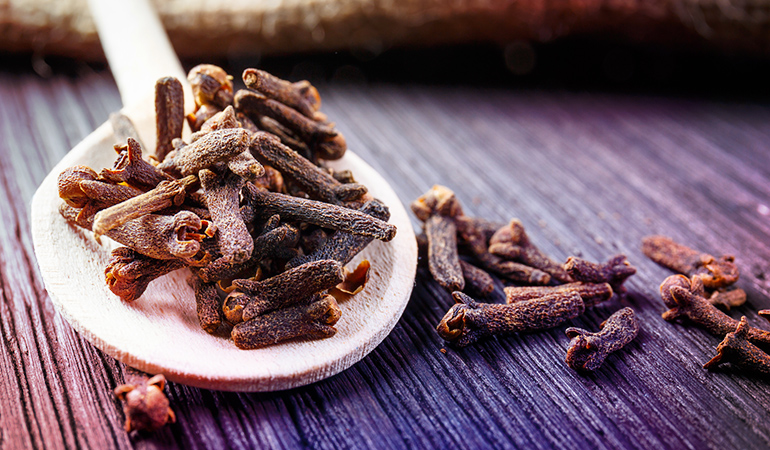What if a single kitchen spice could do more for your health than some of the supplements lining your cabinet? Cloves—those tiny, nail-shaped buds often tucked into spiced desserts or simmering stews—pack an unexpected punch. Just three a day might help sharpen your digestion, support your immune system, and even ease everyday inflammation.
It’s not folklore. These aromatic buds are loaded with compounds like eugenol and antioxidants that have been studied for their real biological effects—from regulating blood sugar to protecting liver cells from damage. In fact, cloves contain more antioxidants per gram than many superfoods that get far more attention.
So what actually happens when you eat three cloves every day? Here’s what science and tradition both suggest you might experience—starting with the nutrients inside those unassuming little buds.
Why Cloves Deserve a Spot in Your Daily Routine
Cloves have been used in traditional medicine for centuries, but their benefits aren’t just based on folk wisdom. Modern research backs many of their historical uses, making them a legitimate addition to a daily wellness routine—especially when used consistently in small, controlled amounts.
These dried flower buds from the Syzygium aromaticum tree offer more than just flavor. They contain natural compounds with antibacterial, anti-inflammatory, and antioxidant properties that impact multiple systems in the body. And unlike many supplements that target a single function, cloves offer wide-ranging support—from digestion and immunity to blood sugar control and pain relief.
What makes them stand out is their potency. Cloves are one of the richest sources of antioxidants among spices. According to the Oxygen Radical Absorbance Capacity (ORAC) scale, which measures antioxidant activity, cloves score significantly higher than more commonly touted options like blueberries or turmeric. That means they help combat oxidative stress, a major contributor to aging and chronic disease.
Cloves are also naturally antimicrobial, which explains their long-standing use in oral care products and home remedies for infections. And thanks to their concentration of eugenol—a bioactive compound studied for its therapeutic effects—they also support metabolic function, protect the liver, and may help with inflammation-related conditions.
The Compounds That Make Cloves So Potent

The power of cloves comes down to a handful of naturally occurring compounds that act like multi-tools in the body—targeting inflammation, supporting metabolism, and defending against harmful microbes. The most notable among them is eugenol, a phytochemical that gives cloves their distinct aroma and most of their therapeutic effects.
Eugenol has been shown in studies to act as an antioxidant, anti-inflammatory, antimicrobial, and even a mild anesthetic. It helps reduce oxidative stress by neutralizing free radicals—unstable molecules that contribute to aging, inflammation, and chronic diseases like heart disease and cancer. Eugenol is also what makes cloves effective for relieving toothaches, fighting infections, and easing digestive discomfort.
Another standout nutrient in cloves is manganese, a trace mineral that plays an essential role in bone formation, enzyme activation, and blood sugar regulation. Just a teaspoon of ground cloves contains over 50% of the recommended daily intake of manganese. This makes even small daily amounts—like three whole cloves—a meaningful contribution to your nutrient intake.
Cloves also contain vitamin K, which supports proper blood clotting, and a small amount of vitamin C, an essential antioxidant that helps maintain immune function. On top of that, they offer dietary fiber, which can help regulate digestion, blood sugar, and cholesterol.
Rounding out the lineup are flavonoids and phenolic acids—plant-based antioxidants known to protect cells from damage, support cardiovascular health, and improve overall metabolic function.
Health Benefits of Eating 3 Cloves Daily

Eating three cloves a day may not seem like much, but this small habit can deliver a broad range of benefits. Backed by both traditional use and modern studies, the effects are especially noticeable when cloves are consumed consistently. Here’s what you can realistically expect from making this a part of your daily routine:
1. Smoother Digestion
Cloves help stimulate digestive enzymes and reduce gas formation, making them useful for relieving bloating, indigestion, and nausea. Eugenol and other compounds in cloves have carminative properties, which means they help prevent the buildup of gas in the gastrointestinal tract. Chewing a few cloves after meals or drinking clove-infused water can offer fast relief from digestive discomfort.
2. Stronger Immune Defenses
Eugenol acts as a natural antimicrobial that can help your body fend off bacteria, viruses, and fungi. Some research even shows that clove oil may increase white blood cell count, which is critical for fighting infections. Including cloves in your daily diet may help you recover faster from colds or reduce how often you get sick.
3. More Stable Blood Sugar Levels
Clove compounds have been shown to mimic insulin-like activity, improving glucose uptake and helping regulate blood sugar levels. In people with type 2 diabetes, small daily doses of cloves have been linked to improved insulin function and reduced post-meal glucose spikes. While not a substitute for medication, they may offer additional support when used alongside a balanced diet.
4. Natural Pain Relief and Anti-Inflammatory Action
Cloves have long been used to relieve toothaches, but their pain-relieving effects go beyond the mouth. Eugenol has been studied for its ability to reduce inflammation and dull pain, making it potentially useful for people with joint discomfort or headaches. Clove tea or clove oil (used topically and carefully) may help soothe common aches and pains.
5. Oral Health Support
Clove oil is still used in modern dentistry for its anesthetic and antibacterial effects. Chewing on cloves or rinsing with clove-infused water can help kill harmful oral bacteria, reduce bad breath, and soothe gum irritation. It’s a simple way to support oral hygiene alongside regular brushing and flossing.

6. Liver Protection
Your liver handles detoxification, and research suggests eugenol may help protect liver cells from damage. Animal studies have shown that clove extracts may reduce oxidative stress and inflammation in the liver, potentially supporting its function. While human studies are still limited, moderate clove consumption appears to be safe and beneficial for liver health.
7. Bone Health Maintenance
Cloves are a natural source of manganese, a mineral essential for bone formation and repair. Manganese helps regulate enzymes involved in the formation of cartilage and bone tissue. Over time, regular intake of manganese-rich foods like cloves may support bone density and reduce the risk of osteoporosis—especially when paired with calcium and vitamin D.
8. Better Respiratory Function
Thanks to their anti-inflammatory and expectorant effects, cloves can help loosen mucus and clear the airways. People with mild asthma, bronchitis, or seasonal coughs may find relief from drinking clove tea or adding cloves to warm milk at night.
9. Skin Support from the Inside Out
Antioxidants in cloves may help protect the skin by reducing inflammation and oxidative stress. Some people also use clove-infused water or clove oil topically (diluted) to manage acne. Internally, consistent clove consumption may contribute to clearer, healthier skin over time.
How to Add Cloves to Your Diet

Cloves are potent, so a little goes a long way. To get the benefits without irritating your stomach or triggering side effects, it’s important to stick to modest, consistent intake—like three whole cloves per day. Here are simple, realistic ways to make that happen:
1. Chew Them Raw
This is the most direct method: chew two to three whole cloves on an empty stomach or after meals. The taste is sharp and slightly numbing due to eugenol, so it might take some getting used to. Start with one clove and build up if needed.
2. Make Clove-Infused Water or Tea
Soak 2–3 whole cloves in a glass of water overnight and drink it first thing in the morning. Alternatively, boil them in water for 5–10 minutes to make a tea. You can add ginger, cinnamon, or lemon to improve the flavor and add other health benefits.
3. Add to Cooking
Ground cloves can be added to soups, stews, curries, and even oatmeal or baked goods. Just ¼ teaspoon of ground clove is equivalent to about two to three whole cloves, making it easy to incorporate into meals without overpowering the dish.
4. Mix with Honey or Herbal Blends
Powdered clove mixed with raw honey can be taken as a quick remedy for sore throat or to soothe digestion. A small pinch (less than ¼ tsp) is enough. You can also blend cloves into homemade chai or golden milk.
5. Use in Spice Mixes or Marinades
If you cook with spice blends like garam masala or pumpkin spice, you’re likely already using cloves in small amounts. Sprinkle blends into savory or sweet dishes for consistent intake without needing to measure cloves each time.
What to Watch Out For: Safety and Side Effects

Cloves are generally safe when consumed in small amounts, like the 2–3 whole cloves recommended daily. But their potency means they can cause problems if overused—especially in concentrated forms like clove oil or supplements. Here’s what you need to know before making them a daily habit.
1. Overconsumption Can Backfire
Eating too many cloves—especially more than 5–6 whole cloves a day—can irritate your digestive system. Common symptoms include:
- Heartburn
- Nausea
- Diarrhea
- Abdominal discomfort
In rare cases, especially with clove oil, excessive intake can lead to liver toxicity due to high levels of eugenol. This is most concerning in children or people with existing liver issues.
2. Blood-Thinning Effects
Eugenol has mild blood-thinning properties, which can be helpful for circulation but risky if you’re:
- Taking blood thinners (like warfarin)
- Planning surgery (clove intake should be stopped two weeks before)
- Prone to bleeding or have clotting disorders
If you’re in any of these categories, talk to your doctor before making cloves a regular part of your diet.

3. Blood Sugar Drops
Cloves can lower blood sugar, which might be beneficial for some but problematic for others. If you’re already on medication for diabetes or hypoglycemia, combining cloves with your treatment without supervision could lead to dangerously low blood sugar levels.
4. Potential Allergies or Sensitivities
While uncommon, some people may experience allergic reactions to cloves, such as:
- Skin irritation (when using clove oil topically)
- Respiratory symptoms (especially if inhaled or used in aromatherapy in high amounts)
- Mouth or throat discomfort if chewed raw in excess
If you notice itching, rash, swelling, or shortness of breath after using cloves, discontinue use and seek medical advice.
5. Don’t Substitute Clove Oil for Whole Cloves
Clove oil is far more concentrated than the whole spice. Even small doses taken internally can be toxic, especially in children. It should never be ingested unless under medical supervision. Topical use should always be diluted with a carrier oil, and never applied directly to broken skin or gums.
Is This Tiny Habit Worth It?
Yes—adding three cloves to your daily routine is a small, low-effort habit that can deliver wide-reaching health benefits. From supporting digestion and metabolism to easing inflammation and strengthening your immune system, cloves offer a range of protective effects backed by both traditional use and emerging research.
The key is consistency and moderation. You don’t need to overhaul your diet or commit to complicated routines. Just chewing a few cloves, steeping them in tea, or adding them to meals can make a difference over time—especially if you’re looking for natural ways to support your health without relying on pills or synthetic supplements.
But it’s not a cure-all. Cloves work best as part of a balanced lifestyle, not a standalone fix. Pay attention to how your body responds, and don’t exceed the recommended amount—more isn’t better when it comes to potent spices like this.
If you’re looking for a simple, evidence-backed way to support your health from the inside out, making cloves a daily habit is absolutely worth considering. It’s an easy step that, over time, can quietly contribute to better digestion, stronger immunity, and overall well-being—without disrupting your life.
Sources :
- Pinto, E., Vale-Silva, L., Cavaleiro, C., & Salgueiro, L. (2009). Antifungal activity of the clove essential oil from Syzygium aromaticum on Candida, Aspergillus and dermatophyte species. Journal of Medical Microbiology, 58(11), 1454–1462. https://doi.org/10.1099/jmm.0.010538-0
- Devi, K. P., Nisha, S. A., Sakthivel, R., & Pandian, S. K. (2010). Eugenol (an essential oil of clove) acts as an antibacterial agent against Salmonella typhi by disrupting the cellular membrane. Journal of Ethnopharmacology, 130(1), 107–115. https://doi.org/10.1016/j.jep.2010.04.025











Leave a Reply